最新人教精通版小学英语六年级上册单元知识点总结(全册)
人教精通版六年级英语上册各单元知识点汇总

人教精通版六年级英语上册各单元知识点汇总Unit 1 I go to school at 8:00.单元知识必备清单重点词汇breakfast 早餐lunch 午餐dinner 晚餐walk 走; 步行every 每一个morning 早晨evening 晚上; 傍晚often 时常; 常常afternoon 下午easy 容易difficult 困难重点短语see a film 看电影clean the window 擦窗户c lean the door 擦门clean the floor 擦地板get up 起床take a walk 散步go to school 去上学have breakfast 吃早餐go home 回家go to bed 睡觉cook breakfast 做早餐teach English 教英语read stories 读故事have lunch 吃午饭have dinner 吃晚饭play the piano 弹钢琴重点句型1 School begins at 9:00. 九点钟开始上课。
解读: 该句是一般现在时,其中主语School 是第三人称单数,所以谓语动词begin 用第三人称单数形式begins。
“School begins.”的同义句为“Class begins.”。
2 School is over at 3:30 in the afternoon. 下午三点半放学。
解读: 该句是谓语为系动词的一般现在时句型,主语School 是第三人称单数,所以be动词用is,“be over”意为“结束”,over 在此处是副词。
3 She gets up at 6:00 in the morning. 她在早晨六点起床。
She doesn’t get up at 6:30 in the morning. 她不在早晨六点半起床。
解读: 在一般现在时的肯定句中,主语是第三人称单数时,谓语动词要用第三人称单数形式。
最新人教精通版小学英语六年级上册单元知识点总结(全册)

Unit1Igotoschoolat8:00.一、核心词汇1.描述日常活动的词汇cleanthewindow擦窗户cleanthedoor擦门cleanthefloor擦地板2.描述三餐的词汇breakfast早餐lunch午餐dinner晚餐3.描述时间的词汇morning早晨afternoon下午evening晚上; 傍晚4.频率副词often时常; 常常5.其他walk走; 步行every每一个easy容易difficult困难二、拓展词组描述日常活动的词组getup起床havebreakfast吃早餐gotoschool去上学havelunch吃午饭gohome回家havedinner吃晚饭watchTV看电视gotobed睡觉cookbreakfast做早餐teachEnglish教英语takeawalk散步readstories读故事seeafilm看电影playthepiano弹钢琴三、核心句型1.Igetupat7:30inthemorning. 我早晨七点半起床。
解读:此句是一个陈述句, 用来描述我在某一时刻所做的事情。
举一反三:Igotoschoolat8:00inthemorning. 我早晨八点去上学。
2.Shedoesn’tgetupat6:30inthemorning.她不在上午六点半起床。
解读: 此句是一个否定句, 用来描述某人在某一时刻没有做的事情。
举一反三:Shedoesn’tgetupat6:40.她不在六点四十分起床。
3.— WhatdoyoudoonSaturdays? 你星期六做什么?— Ioftengoandseeafilmwithmyparents. 我经常和我的父母一起去看电影。
解读:这是用来询问对方某天做什么及其回答的句子。
举一反三:— Whatdoyoudoontheweekend? 你周末做什么?— Ioftendohomework. 我经常做作业。
最新完整版人教版六年级英语上册总复习各单元知识点归纳总结及作文范文汇总
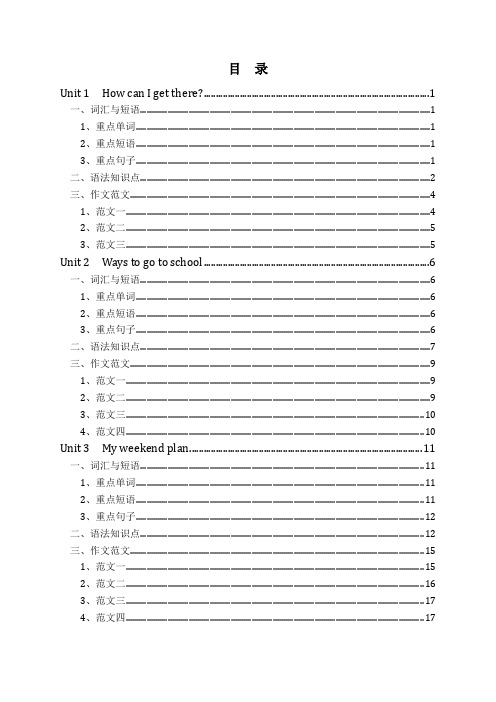
目录Unit 1 How can I get there? (1)一、词汇与短语 (1)1、重点单词 (1)2、重点短语 (1)3、重点句子 (1)二、语法知识点 (2)三、作文范文 (4)1、范文一 (4)2、范文二 (5)3、范文三 (5)Unit 2 Ways to go to school (6)一、词汇与短语 (6)1、重点单词 (6)2、重点短语 (6)3、重点句子 (6)二、语法知识点 (7)三、作文范文 (9)1、范文一 (9)2、范文二 (9)3、范文三 (10)4、范文四 (10)Unit 3 My weekend plan (11)一、词汇与短语 (11)1、重点单词 (11)2、重点短语 (11)3、重点句子 (12)二、语法知识点 (12)三、作文范文 (15)1、范文一 (15)2、范文二 (16)3、范文三 (17)4、范文四 (17)Unit 4 I have a pen pal (18)一、词汇与短语 (18)1、重点单词 (18)2、重点短语 (18)3、重点句子 (18)二、语法知识点 (19)三、作文范文 (23)1、范文一 (24)2、范文二 (24)3、范文三 (25)4、范文四 (25)Unit 5 What does he do (27)一、词汇与短语 (27)1、重点单词 (27)2、重点短语 (27)3、重点句子 (27)二、语法知识点 (28)三、作文范文 (30)1、范文一 (30)2、范文二 (31)3、范文三 (31)Unit 6 How do you feel (32)一、词汇与短语 (32)1、重点单词 (32)2、重点短语 (32)3、重点句子 (32)二、语法知识点 (33)三、作文范文 (34)1、范文一 (35)2、范文二 (35)3、范文三 (35)4、范文四 (35)语法知识点 (37)肯定句如何变否定句 (37)肯定句如何变一般疑问句 (39)划线部分提问(如何变特殊疑问句) (41)写作训练 (43)写作训练答案 (47)Unit 1 How can I get there?一、词汇与短语1、重点单词1.science /ˈsaɪəns/ 科学2.museum /mjuˈziːəm/ 博物馆3.post office /ˈpəʊst ɒfɪs/ 邮局4.bookstore /ˈbʊkstɔː/ 书店5.cinema /ˈsɪnəmə/ 电影院6.hospital /ˈhɒspɪtl/ 医院7.crossing /ˈkrɒsɪŋ/ 十字路口8.turn /tɜːn/ 转湾9.left /left/ 左10.right /raɪt/ 右11.straight /streɪt/ 笔直地12.ask /ɑːsk/ 问13.sir /sɜː(r)/ (对男子的礼貌称呼)先生14.interesting /ˈɪntrəstɪŋ/ 有趣的15.Italian /ɪˈtæliən/ 意大利的16.restaurant /ˈrestrɒnt/ 餐馆17.pizza /ˈpiːtsə/ 比萨饼18.street /striːt]/ 大街;街道19.get /get/ 到达20.gave /ɡeɪv/( give/ɡɪv/的过去式) 给21.follow /ˈfɒləʊ/ 跟着22.tell /tel/ 告诉2、重点短语1.science museum 科学博物馆2.near the library 图书馆附近3.get there 到达那里4.go straight 直走5.turn left/right 向左转/右转6.over there 在那边7.next to the museum 在博物馆旁边8.pet hospital 宠物医院9.Palace museum 故宫博物院10.in front of 在…前面11.behind the post office 在邮局后面12.beside the park 在公园旁边13.be far from 离……很远14.be far from home 远离家乡3、重点句子1. --Where is the museum shop?博物馆商店在哪里--It's near the door. 它在门附近。
人教精通版小学英语六年级上册单元知识点总结(全册)(完美版)

Unit1Igotoschoolat8:00.一、核心词汇1.描述日常活动的词汇cleanthewindow擦窗户cleanthedoor擦门cleanthefloor擦地板2.描述三餐的词汇breakfast早餐lunch午餐dinner晚餐3.描述时间的词汇morning早晨afternoon下午evening晚上; 傍晚4.频率副词often时常; 常常5.其他walk走; 步行every每一个easy容易difficult困难二、拓展词组描述日常活动的词组getup起床havebreakfast吃早餐gotoschool去上学havelunch吃午饭gohome回家havedinner吃晚饭watchTV看电视gotobed睡觉cookbreakfast做早餐teachEnglish教英语takeawalk散步readstories读故事seeafilm看电影playthepiano弹钢琴三、核心句型1.Igetupat7:30inthemorning. 我早晨七点半起床。
解读:此句是一个陈述句, 用来描述我在某一时刻所做的事情。
举一反三:Igotoschoolat8:00inthemorning. 我早晨八点去上学。
她不在上午六点半起床。
2.Shedoesn’tgetupat6:30inthemorning.解读: 此句是一个否定句, 用来描述某人在某一时刻没有做的事情。
举一反三:Shedoesn’tgetupat6:40.她不在六点四十分起床。
3.— WhatdoyoudoonSaturdays? 你星期六做什么?— Ioftengoandseeafilmwithmyparents. 我经常和我的父母一起去看电影。
解读:这是用来询问对方某天做什么及其回答的句子。
举一反三:— Whatdoyoudoontheweekend? 你周末做什么?— Ioftendohomework. 我经常做作业。
六年级英语上册(精通版)Unit 1必备知识点

六年级英语上册(精通版)Unit 1 I go to school at 8:00.必备知识点六年级英语上册(精通版)Unit 1 "I go to school at 8:00"的必备知识点主要包括词汇、词组、核心句型和语法等方面。
以下是对这些知识点的详细归纳:一、核心词汇1. 描述日常活动的词汇:clean the window(擦窗户)clean the door(擦门)clean the floor(擦地板)cook breakfast(做早餐)teach English(教英语)take a walk(散步)read stories(读故事)see a film(看电影)play the piano(弹钢琴)2. 描述三餐的词汇:breakfast(早餐)lunch(午餐)dinner(晚餐)3. 描述时间的词汇:morning(早晨)afternoon(下午)evening(晚上/傍晚)4. 其他常用词汇:often(时常;常常)walk(走;步行)every(每一个)easy(容易)difficult(困难)二、拓展词组1. 描述日常活动的词组:get up(起床)have breakfast(吃早餐)go to school(去上学)have lunch(吃午饭)go home(回家)have dinner(吃晚饭)watch TV(看电视)go to bed(睡觉)三、核心句型1. 描述个人日常活动的句型:I get up at 7:30 in the morning.(我早晨七点半起床。
)I have breakfast at 8:00.(我八点吃早餐。
)I go to school at 8:00 in the morning.(我早晨八点去上学。
)2. 否定句的使用:She doesn't get up at 6:30 in the morning.(她不在上午六点半起床。
小学英语人教精通版六年级上册重点归纳

小学英语人教精通版六年级上册重点归纳第一单元Unit 1 重点单词:lunch 午餐every 每一个evening 晚上difficult困难重点词组:1. daily life 日常生活3. in the morning 在早晨上午5. in the evening 在晚上7. have lunch 吃午餐walk 走;步行afternoon 下午easy容易2. get up 起床4. in the afternoon 在下午6. have breakfast 吃早餐8. have dinner 吃晚餐10. go home 回家12. do some reading 阅读14. cook breakfast 做早餐16. teach English 教英语18. every morning 每天早晨20. on Sundays 在星期日22. have Pia no IeSS OnS 上钢琴课24. at home 在家25. help sb. to do the housework帮助某人做家务26. clea n the door扌察门27. clean the window 擦窗户I go to school at 8:00dinner 晚餐morning 早上often时常;常常9. go to school 去上学11. watch TV 看电视13. go to bed 睡觉15. take a walk 散步17. read stories 读故事19. on Saturdays 在星期六21. see a film 看电影23. play the piano 弹钢琴28. clean the floor 擦地板重点句型:1.I don'h t ave breakfast at 7:00 in the morning .我不是在早上七点钟吃早餐。
2.She gets up at 6:00 in the morning 她. 在早上六点钟起床。
人教精通版小学英语六年级上册重点归纳
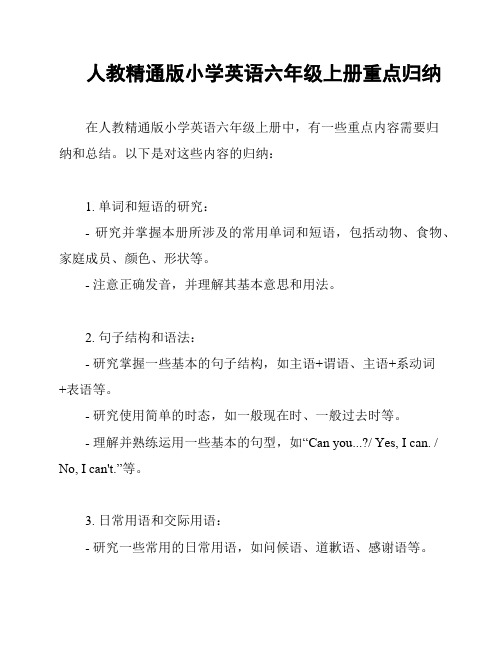
人教精通版小学英语六年级上册重点归纳
在人教精通版小学英语六年级上册中,有一些重点内容需要归
纳和总结。
以下是对这些内容的归纳:
1. 单词和短语的研究:
- 研究并掌握本册所涉及的常用单词和短语,包括动物、食物、家庭成员、颜色、形状等。
- 注意正确发音,并理解其基本意思和用法。
2. 句子结构和语法:
- 研究掌握一些基本的句子结构,如主语+谓语、主语+系动词
+表语等。
- 研究使用简单的时态,如一般现在时、一般过去时等。
- 理解并熟练运用一些基本的句型,如“Can you...?/ Yes, I can. / No, I can't.”等。
3. 日常用语和交际用语:
- 研究一些常用的日常用语,如问候语、道歉语、感谢语等。
- 研究并练简单的交际用语,如问答基本信息、提出请求、表达意见等。
4. 阅读理解:
- 阅读短文或简单的对话,理解其中的基本内容和信息。
- 掌握提取关键信息的技巧,如找出主题句、主要人物等。
5. 听力训练:
- 听取简短的对话或句子,理解其基本意思。
- 提高听力技巧,包括听清语音、辨别关键词等。
6. 书写和拼写:
- 研究正确书写和拼写常见的单词和短语。
- 注意字母大小写和书写规范。
以上是人教精通版小学英语六年级上册的重点归纳。
通过研究这些内容,可以提高英语听、说、读、写的能力,为接下来的研究打下基础。
> *注意:上述内容为总结归纳,具体细节和例句可详细阅读教材内容。
*。
六年级上册英语1-4单元必考知识点总结

Unit 3 What are you going to do?
一.词汇 'next week 下周
newsp叩er 报纸
this morning 今天上午
comic book漫画书
Time: (时间)
this afternoon 今天下午 this evening今天晚上
magazine 杂志 dictionary 字典
make kites (making kites )制作风筝 colLect stamps (collecting stamps)集邮
三单
Live (lives)居住,住 teach (teaches)教 go (goes)去 watch (watches)看 read (reads)读
其他show (展览)
(交通工具前加by,表示乘坐但步行要用on foot)
三会一
fifth第五 difference 不同 country 国家 right右边的 Australia澳大利亚 if如果
remember 记住 same相同的 mean意思是
side 边 however 但是 must必须
find找到 every每个所有的 drive驾驶
do (does) pen pal(笔友)
dear (亲爱的)
look(看上去)fun(快乐,乐趣)
with(同…)
三、重点句型:
1 .询问某人的爱好:
---------- What's your hobby?你的爱好是什么?
-----------1 Like collecting stamps.我喜欢集邮 2 .表示征求别人意见:
我坐飞机去。
■ ----------- How does your father go to work? ----------- He goes to work by subway.
小学英语人教精通版六年级(上册)重点归纳
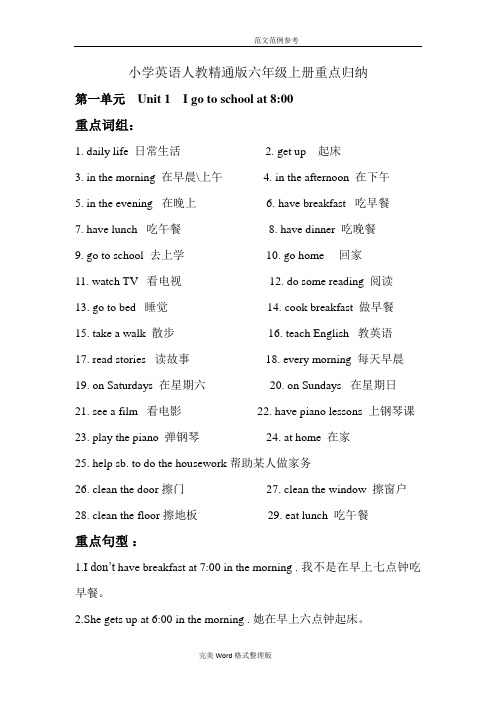
小学英语人教精通版六年级上册重点归纳第一单元Unit 1 I go to school at 8:00重点词组:1. daily life 日常生活2. get up 起床3. in the morning 在早晨\上午4. in the afternoon 在下午5. in the evening 在晚上6. have breakfast 吃早餐7. have lunch 吃午餐8. have dinner 吃晚餐9. go to school 去上学10. go home 回家11. watch TV 看电视12. do some reading 阅读13. go to bed 睡觉14. cook breakfast 做早餐15. take a walk 散步16. teach English 教英语17. read stories 读故事18. every morning 每天早晨19. on Saturdays 在星期六20. on Sundays 在星期日21. see a film 看电影22. have piano lessons 上钢琴课23. play the piano 弹钢琴24. at home 在家25. help sb. to do the housework 帮助某人做家务26. clean the door 擦门27. clean the window 擦窗户28. clean the floor 擦地板29. eat lunch 吃午餐重点句型:1.I don’t have breakfast at 7:00 in the morning . 我不是在早上七点钟吃早餐。
2.She gets up at 6:00 in the morning . 她在早上六点钟起床。
3.She doesn’t get up at 6:30 in the morning . 她不是在早上6:30起床。
小学英语人教精通版六年级上册重点归纳

小学英语人教精通版六年级上册重点归纳第一单元Unit 1 I go to school at 8:00重点单词:lunch 午餐dinner 晚餐walk 走;步行every 每一个morning 早上afternoon 下午evening 晚上often 时常;常常easy 容易difficult困难重点词组:1. daily life 日常生活2. get up 起床3. in the morning 在早晨\上午4. in the afternoon 在下午5. in the evening 在晚上6. have breakfast 吃早餐7. have lunch 吃午餐8. have dinner 吃晚餐9. go to school 去上学10. go home 回家11. watch TV 看电视12. do some reading 阅读13. go to bed 睡觉14. cook breakfast 做早餐15. take a walk 散步16. teach English 教英语17. read stories 读故事18. every morning 每天早晨19. on Saturdays 在星期六20. on Sundays 在星期日21. see a film 看电影22. have piano lessons 上钢琴课23. play the piano 弹钢琴24. at home 在家25. help sb. to do the housework 帮助某人做家务26. clean the door 擦门27. clean the window 擦窗户28. clean the floor 擦地板重点句型:1.I don’t have breakfast at 7:00 in the morning . 我不是在早上七点钟吃早餐。
2.She gets up at 6:00 in the morning . 她在早上六点钟起床。
六年级上英语精通版
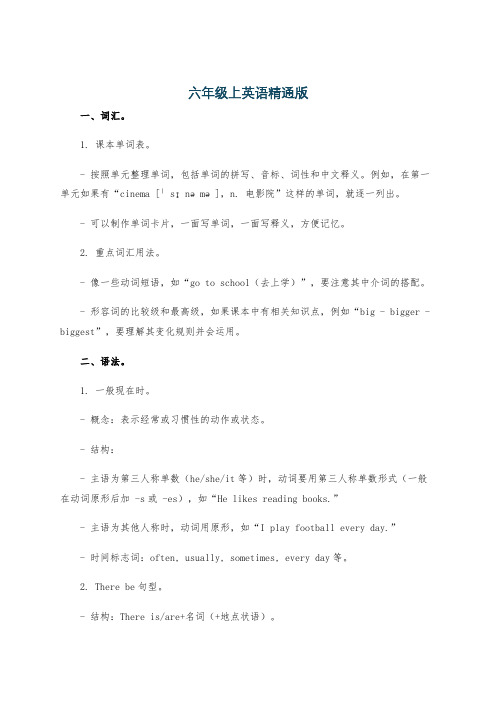
六年级上英语精通版一、词汇。
1. 课本单词表。
- 按照单元整理单词,包括单词的拼写、音标、词性和中文释义。
例如,在第一单元如果有“cinema [ˈsɪnəmə],n. 电影院”这样的单词,就逐一列出。
- 可以制作单词卡片,一面写单词,一面写释义,方便记忆。
2. 重点词汇用法。
- 像一些动词短语,如“go to school(去上学)”,要注意其中介词的搭配。
- 形容词的比较级和最高级,如果课本中有相关知识点,例如“big - bigger - biggest”,要理解其变化规则并会运用。
二、语法。
1. 一般现在时。
- 概念:表示经常或习惯性的动作或状态。
- 结构:- 主语为第三人称单数(he/she/it等)时,动词要用第三人称单数形式(一般在动词原形后加 -s或 -es),如“He likes reading books.”- 主语为其他人称时,动词用原形,如“I play football every day.”- 时间标志词:often, usually, sometimes, every day等。
2. There be句型。
- 结构:There is/are+名词(+地点状语)。
- 区别:is用于单数名词或不可数名词,are用于复数名词。
例如“There is a book on the desk.”和“There are some books on the desk.”- 就近原则:如果be动词后面有多个名词,be动词的形式要根据离它最近的名词的单复数来确定,如“There is a pen and two pencils in the box.”三、句型。
1. 询问职业。
- What does your father do? He is a doctor.- 要学会替换不同的职业单词,如teacher, worker, driver等。
2. 询问爱好。
- What are your hobbies? I like singing and dancing.- 注意hobby(单数)和hobbies(复数)的用法区别。
小学英语人教精通版六年级(上册)重点归纳

小学英语人教精通版六年级上册重点归纳第一单元Unit 1 I go to school at 8:00重点词组:1. daily life 日常生活2. get up 起床3. in the morning 在早晨\上午4. in the afternoon 在下午5. in the evening 在晚上6. have breakfast 吃早餐7. have lunch 吃午餐8. have dinner 吃晚餐9. go to school 去上学10. go home 回家%11. watch TV 看电视12. do some reading 阅读13. go to bed 睡觉14. cook breakfast 做早餐15. take a walk 散步16. teach English 教英语17. read stories 读故事18. every morning 每天早晨19. on Saturdays 在星期六20. on Sundays 在星期日21. see a film 看电影22. have piano lessons 上钢琴课23. play the piano 弹钢琴24. at home 在家25. help sb. to do the housework 帮助某人做家务>26. clean the door 擦门27. clean the window 擦窗户28. clean the floor 擦地板29. eat lunch 吃午餐重点句型:don’t have breakfast at 7:00 in the morning . 我不是在早上七点钟吃早餐。
gets up at 6:00 in the morning . 她在早上六点钟起床。
doesn’t get up at 6:30 in the morning . 她不是在早上6:30起床。
人教精通版六年级英语上册全册单元知识点
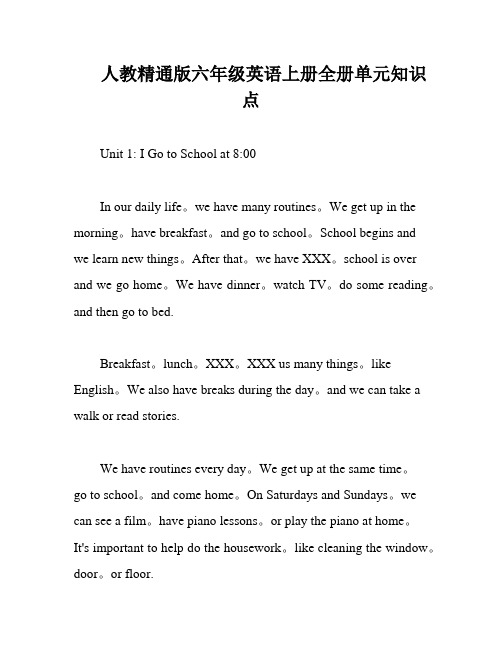
人教精通版六年级英语上册全册单元知识点Unit 1: I Go to School at 8:00In our daily life。
we have many routines。
We get up in the morning。
have breakfast。
and go to school。
School begins andwe learn new things。
After that。
we have XXX。
school is over and we go home。
We have dinner。
watch TV。
do some reading。
and then go to bed.Breakfast。
lunch。
XXX。
XXX us many things。
like English。
We also have breaks during the day。
and we can take a walk or read stories.We have routines every day。
We get up at the same time。
go to school。
and come home。
On Saturdays and Sundays。
we can see a film。
have piano lessons。
or play the piano at home。
It's important to help do the housework。
like cleaning the window。
door。
or floor.In summary。
our daily life is full of routines and activities。
Some are easy。
while others are difficult。
but they all help us grow and learn.Unit 2 What's Your Hobby?Do you have any hobbies。
人教版六年级英语上册知识点重点难点考点汇总
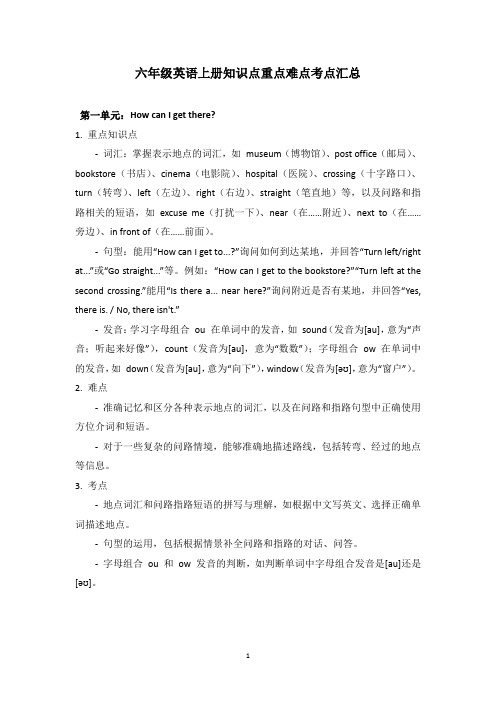
六年级英语上册知识点重点难点考点汇总第一单元:How can I get there?1. 重点知识点-词汇:掌握表示地点的词汇,如museum(博物馆)、post office(邮局)、bookstore(书店)、cinema(电影院)、hospital(医院)、crossing(十字路口)、turn(转弯)、left(左边)、right(右边)、straight(笔直地)等,以及问路和指路相关的短语,如excuse me(打扰一下)、near(在……附近)、next to(在……旁边)、in front of(在……前面)。
-句型:能用“How can I get to...?”询问如何到达某地,并回答“Turn left/right at...”或“Go straight...”等。
例如:“How can I get to the bookstore?”“Turn left at the second crossing.”能用“Is there a... near here?”询问附近是否有某地,并回答“Yes, there is. / No, there isn't.”-发音:学习字母组合ou 在单词中的发音,如sound(发音为[au],意为“声音;听起来好像”),count(发音为[au],意为“数数”);字母组合ow 在单词中的发音,如down(发音为[au],意为“向下”),window(发音为[əʊ],意为“窗户”)。
2. 难点-准确记忆和区分各种表示地点的词汇,以及在问路和指路句型中正确使用方位介词和短语。
-对于一些复杂的问路情境,能够准确地描述路线,包括转弯、经过的地点等信息。
3. 考点-地点词汇和问路指路短语的拼写与理解,如根据中文写英文、选择正确单词描述地点。
-句型的运用,包括根据情景补全问路和指路的对话、问答。
-字母组合ou 和ow 发音的判断,如判断单词中字母组合发音是[au]还是[əʊ]。
小学英语人教精通版六年级(上册)重点归纳
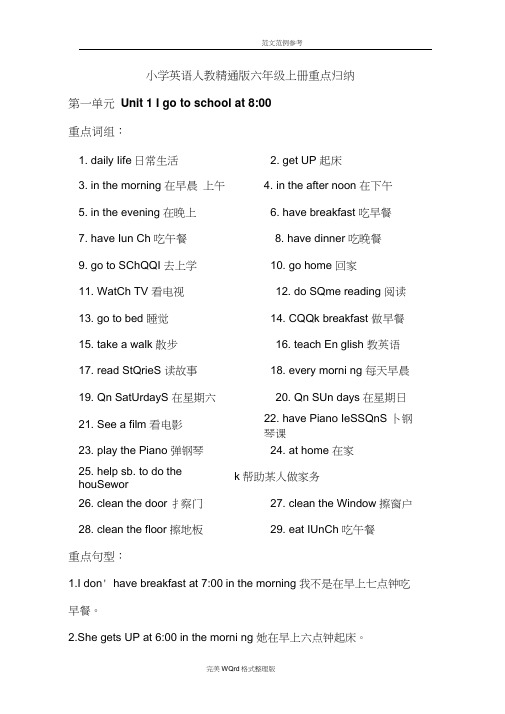
小学英语人教精通版六年级上册重点归纳第一单元Unit 1 I go to school at 8:00重点词组:1. daily Iife日常生活2. get UP 起床3. in the morning 在早晨上午4. in the after noon 在下午5. in the evening 在晚上6. have breakfast 吃早餐7. have Iun Ch 吃午餐8. have dinner 吃晚餐9. go to SChQQI 去上学10. go home 回家11. WatCh TV 看电视12. do SQme reading 阅读13. go to bed 睡觉14. CQQk breakfast 做早餐15. take a walk 散步16. teach En glish 教英语17. read StQrieS 读故事18. every morni ng 每天早晨19. Qn SatUrdayS 在星期六20. Qn SUn days在星期日21. See a film 看电影22. have Piano IeSSQnS 卜钢琴课23. play the Piano 弹钢琴24. at home 在家25. help sb. to do thek帮助某人做家务houSewor26. clean the door扌察门27. clean the Window 擦窗户28. clean the floor 擦地板29. eat IUnCh 吃午餐重点句型:1.I don' have breakfast at 7:00 in the morning 我不是在早上七点钟吃早餐。
2.She gets UP at 6:00 in the morni ng 她在早上六点钟起床。
3.Shedoesn ' g t t UP at 6:30 in the morning .她不是在早上 6:30 起床。
六年级上册人教精通版
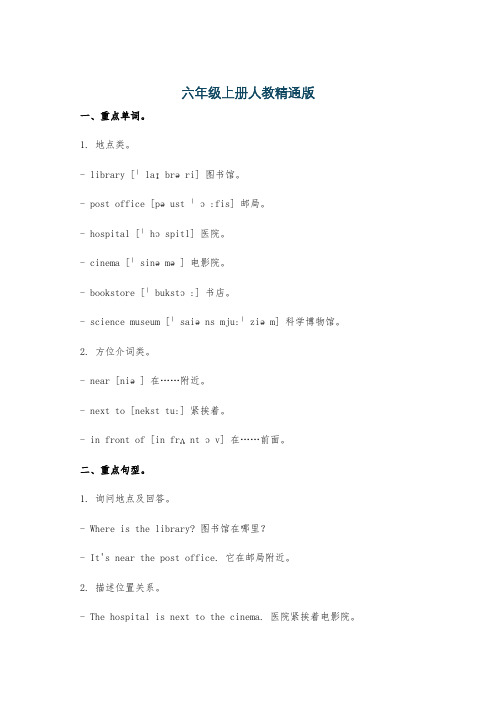
六年级上册人教精通版一、重点单词。
1. 地点类。
- library [ˈlaɪbrəri] 图书馆。
- post office [pəust ˈɔ:fis] 邮局。
- hospital [ˈhɔspitl] 医院。
- cinema [ˈsinəmə] 电影院。
- bookstore [ˈbukstɔ:] 书店。
- science museum [ˈsaiəns mju:ˈziəm] 科学博物馆。
2. 方位介词类。
- near [niə] 在……附近。
- next to [nekst tu:] 紧挨着。
- in front of [in frʌnt ɔv] 在……前面。
二、重点句型。
1. 询问地点及回答。
- Where is the library? 图书馆在哪里?- It's near the post office. 它在邮局附近。
2. 描述位置关系。
- The hospital is next to the cinema. 医院紧挨着电影院。
- There is a bookstore in front of the science museum. 在科学博物馆前面有一个书店。
三、语法点。
1. there be句型。
- 概念:表示“某地有某物”。
- 结构:There is + 单数可数名词/不可数名词+地点状语.- 例如:There is a park in my neighborhood.- There are+复数可数名词+地点状语.- 例如:There are some trees in the park.- 就近原则:当有多个并列主语时,be动词的形式取决于离它最近的主语的单复数形式。
- 例如:There is a book and two pens on the desk.(离be动词最近的是a book,为单数,所以用is)- There are two pens and a book on the desk.(离be动词最近的是two pens,为复数,所以用are)2. 方位介词的用法。
(完整版)小学英语人教精通版六年级上册重点归纳
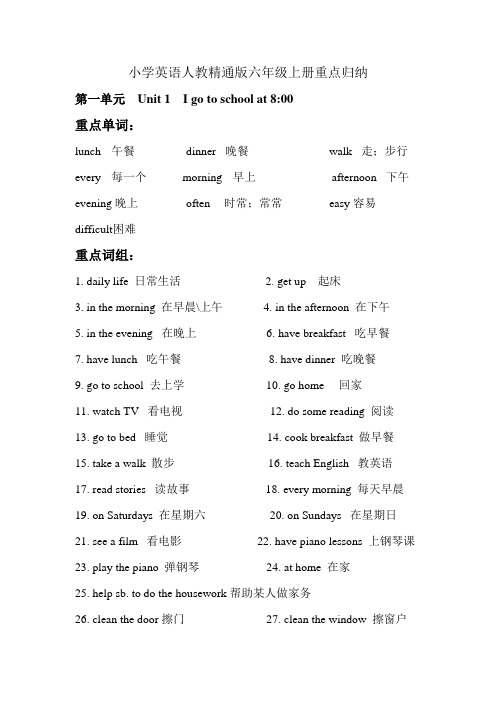
小学英语人教精通版六年级上册重点归纳第一单元Unit 1 I go to school at 8:00重点单词:lunch 午餐dinner 晚餐walk 走;步行every 每一个morning 早上afternoon 下午evening 晚上often 时常;常常easy 容易difficult困难重点词组:1. daily life 日常生活2. get up 起床3. in the morning 在早晨\上午4. in the afternoon 在下午5. in the evening 在晚上6. have breakfast 吃早餐7. have lunch 吃午餐8. have dinner 吃晚餐9. go to school 去上学10. go home 回家11. watch TV 看电视12. do some reading 阅读13. go to bed 睡觉14. cook breakfast 做早餐15. take a walk 散步16. teach English 教英语17. read stories 读故事18. every morning 每天早晨19. on Saturdays 在星期六20. on Sundays 在星期日21. see a film 看电影22. have piano lessons 上钢琴课23. play the piano 弹钢琴24. at home 在家25. help sb. to do the housework 帮助某人做家务26. clean the door 擦门27. clean the window 擦窗户28. clean the floor 擦地板重点句型:1.I don’t have breakfast at 7:00 in the morning . 我不是在早上七点钟吃早餐。
2.She gets up at 6:00 in the morning . 她在早上六点钟起床。
小学英语人教精通版六年级上册重点归纳

小学英语人教精通版六年级上册重点归纳第一单元Unit 1 I go to school at 8:00重点单词:lunch 午餐dinner 晚餐walk 走;步行every 每一个morning 早上afternoon 下午evening 晚上often 时常;常常easy 容易difficult困难重点词组:1. daily life 日常生活2. get up 起床3. in the morning 在早晨\上午4. in the afternoon 在下午5. in the evening 在晚上6. have breakfast 吃早餐7. have lunch 吃午餐8. have dinner 吃晚餐9. go to school 去上学10. go home 回家11. watch TV 看电视12. do some reading 阅读13. go to bed 睡觉14. cook breakfast 做早餐15. take a walk 散步16. teach English 教英语17. read stories 读故事18. every morning 每天早晨19. on Saturdays 在星期六20. on Sundays 在星期日21. see a film 看电影22. have piano lessons 上钢琴课23. play the piano 弹钢琴24. at home 在家25. help sb. to do the housework 帮助某人做家务26. clean the door 擦门27. clean the window 擦窗户28. clean the floor 擦地板重点句型:1.I don’t have breakfast at 7:00 in the morning . 我不是在早上七点钟吃早餐。
2.She gets up at 6:00 in the morning . 她在早上六点钟起床。
- 1、下载文档前请自行甄别文档内容的完整性,平台不提供额外的编辑、内容补充、找答案等附加服务。
- 2、"仅部分预览"的文档,不可在线预览部分如存在完整性等问题,可反馈申请退款(可完整预览的文档不适用该条件!)。
- 3、如文档侵犯您的权益,请联系客服反馈,我们会尽快为您处理(人工客服工作时间:9:00-18:30)。
Unit1Igotoschoolat8:00.一、核心词汇1.描述日常活动的词汇cleanthewindow擦窗户cleanthedoor擦门cleanthefloor擦地板2.描述三餐的词汇breakfast早餐lunch午餐dinner晚餐3.描述时间的词汇morning早晨afternoon下午evening晚上; 傍晚4.频率副词often时常; 常常5.其他walk走; 步行every每一个easy容易difficult困难二、拓展词组描述日常活动的词组getup起床havebreakfast吃早餐gotoschool去上学havelunch吃午饭gohome回家havedinner吃晚饭watchTV看电视gotobed睡觉cookbreakfast做早餐teachEnglish教英语takeawalk散步readstories读故事seeafilm看电影playthepiano弹钢琴三、核心句型1.Igetupat7:30inthemorning. 我早晨七点半起床。
解读:此句是一个陈述句, 用来描述我在某一时刻所做的事情。
举一反三:Igotoschoolat8:00inthemorning. 我早晨八点去上学。
2.Shedoesn’tgetupat6:30inthemorning.她不在上午六点半起床。
解读: 此句是一个否定句, 用来描述某人在某一时刻没有做的事情。
举一反三:Shedoesn’tgetupat6:40.她不在六点四十分起床。
3.— WhatdoyoudoonSaturdays? 你星期六做什么?— Ioftengoandseeafilmwithmyparents. 我经常和我的父母一起去看电影。
解读:这是用来询问对方某天做什么及其回答的句子。
举一反三:— Whatdoyoudoontheweekend? 你周末做什么?— Ioftendohomework. 我经常做作业。
4.DoessheplaythepianoonSaturdays? 她星期六弹钢琴吗?解读:这是一个一般疑问句。
用来询问某人是否做某事。
举一反三:Doesheplayfootballafterschool? 放学后他踢足球吗?5.— WhatdoesKatedoonSaturdays? 凯特星期六做什么?— Sheusuallyplaysthepiano. 她通常弹钢琴。
解读:这是用来询问某人某天做什么及其回答的句子。
举一反三:— Whatdoesshedoontheweekend? 她周末做什么?— Sheoftengoesswimming. 她经常游泳。
6.— DoyoureadstoriesonSundays? 你星期日读故事吗?—No,Idon’t.Ioftenplaythepiano.不。
我经常弹钢琴。
解读:这是用来询问对方某天是否做某事及其回答的句子。
举一反三:— Doyougetupat7:00everyday? 你每天七点起床吗?— Yes,Ido. 是, 是的。
四、了解句型1.I’minPrimarySix.我上小学六年级。
解读:这是用来描述某人所在年级的句子。
举一反三:I’minPrimaryFive.我上小学五年级。
2.MymotherisanEnglishteacher. 我妈妈是一名英语教师。
解读:这是用来描述某人所从事的职业的句子。
举一反三:Mysisterisadoctor. 我姐姐是一名医生。
3.Schoolbegins. 开始上课。
4.Schoolisover. 放学。
Unit2What’syourhobby?一、核心词汇1. 描述人物的词汇dad爸爸mum妈妈kid小孩baby婴儿2. 其他open开; 打开hobby爱好map地图box盒子colour颜色plant植物; 种植flower花drink喝tea茶photo照片hungry饿的cry哭二、拓展词组描述兴趣爱好的词组collecttoycars收集玩具汽车collectstamps收集邮票collectmaps收集地图collectpicturecards收集图片gofishing去钓鱼plantflowers种花cookmeals做饭playcomputergames玩电脑游戏makedolls做布娃娃takephotos照相三、核心句型1. —What’syourhobby,Peter?你的爱好是什么, 彼得?— Myhobbyiscollectingstamps. 我的爱好是收集邮票。
解读:这是询问对方的爱好是什么及其回答的句子。
举一反三:—What’syourhobby?你的爱好是什么?— Myhobbyisplantingtrees. 我的爱好是种树。
2.Ilikeswimminginthepool. 我喜欢在池子里游泳。
解读:这是描述某人喜欢做某事的句子。
举一反三:Shelikesplantingflowers. 她喜欢种花。
3. —What’shedoing?他在做什么?— Mygrandpaisfishing. 我爷爷在钓鱼。
解读:这是询问某人在做什么及其回答的句子。
举一反三:— Whatishedoing? 他在做什么?—He’stakingphotos.他在照相。
4. —What’syourdad’shobby?你爸爸的爱好是什么?— Hishobbyisplantingflowers. 他的爱好是种花。
解读:这是询问某人的爱好是什么及其回答的句子。
举一反三:—What’syourmother’shobby?你妈妈的爱好是什么?— Herhobbyiscollectingstamps. 她的爱好是收集邮票。
5. — Whatareyouinterestedin,Lisa? 你对什么感兴趣, 莉萨?—I’minterestedinmakingdolls.我对做布娃娃感兴趣。
解读:这是询问对方对什么感兴趣及其回答的句子。
举一反三:— Whatisyourmotherinterestedin? 你妈妈对什么感兴趣?—She’sinterestedinmakingmeals.她对做饭感兴趣。
6.Areyouinterestedincooking? 你对烹饪感兴趣吗?解读:这是询问某人对某事是否感兴趣的句子。
举一反三:Isyourmotherinterestedintakingphotos? 你妈妈对照相感兴趣吗?四、了解句型1.CanIhavealook,please? 我能看一看吗?解读:这是询问某人是否能做某事的句子。
举一反三:CanIopenthedoor? 我能打开门吗?2.Whatasupercar! 多么棒的小汽车呀!解读:这是一个感叹句。
举一反三:Whatafineday! 多好的天啊!Unit3Wouldyouliketocometomybirthdayparty?一、核心词汇1.描述食物的词汇chocolate巧克力icecream冰激凌candy糖果2.其他time时间after在……后then那时me我 (I的宾格)bye再见kind种类sure当然here在这里for给; 为了light点燃二、拓展词组1. 描述食物的词组star-shapedcake星形蛋糕heart-shapedcake心形蛋糕fruitpie水果派2.描述生日活动的词组inviteyourfriendstoyourparty邀请朋友参加聚会celebrateyourbirthdaywithyourfriends与朋友庆祝生日giveabirthdaycardtoyourfriend向朋友赠送生日贺卡lightthecandles点蜡烛singthebirthdaysong唱生日歌makeawish许愿blowoutthecandles吹蜡烛cutthecake切蛋糕eatthecake吃蛋糕三、核心句型1.— Wouldyouliketocometomybirthdayparty? 你们想要来参加我的生日聚会吗?—Sure.I’dloveto.是的。
我很愿意参加。
解读:这是询问对方是否想要做某事及其回答的句子。
举一反三:— Wouldyouliketohaveacake? 你想吃一个蛋糕吗?— No,thanks. 不, 谢谢。
2.Pleasecometomybirthdayparty. 请来参加我的生日聚会。
解读:这是一个祈使句。
举一反三:Pleasehaveacake. 请吃一个蛋糕。
3.Don’tforgettowriteyourfriend’sname,andsignyourname,too.不要忘记写上你的朋友的名字, 也要标记上你的名字。
解读:这是一个祈使句的否定形式。
举一反三:Don’thavetoomuchicecream.不要吃太多的冰激凌。
4.— Whatkindofcakewouldyoulike,Lisa? 你想要什么种类的蛋糕, 莉萨?—I’dlikeachocolatecake.我想要一个巧克力蛋糕。
解读:这是用来询问对方想要什么种类的某物及其回答的句子。
举一反三:— Whatkindofbreadwouldyoulike? 你想要什么种类的面包?—I’dlikeasmallpieceofwhitebread.我想要一小块白面包。
5.Howdotheycelebratethebirthday? 他们如何庆祝生日?解读:这是一个询问某人如何做某事的句子。
举一反三:Howdoyouwashyourclothes? 你如何洗衣服?四、了解句型1.Whattimedoesyourpartybegin? 你的聚会几点开始?解读:这是一个询问某事在什么时候进行的句子。
举一反三:Whattimedoesyourschoolbegin? 你几点上课?2. — CanIhavesomeicecream? 我能吃一些冰激凌吗?— Sure. 当然。
解读:这是用来询问某人能否做某事及其回答的句子。
举一反三:— CanIwatchTV? 我能看电视吗?— Sure. 当然。
Unit4Januaryisthefirstmonth.一、核心词汇1. 描述节日的词组Mother’sDay母亲节Children’sDay儿童节Father’sDay父亲节2. 描述月份的词汇January一月February二月March三月April四月May五月June六月3. 其他tree树; 树木grass草; 草地stop(使) 停止egg蛋; 卵back回原处; 后面their他(她、它)们的二、拓展词组1. 描述属于一年里的第几个月的词组thefirstmonthoftheyear一年里的第一个月thesecondmonthoftheyear一年里的第二个月thethirdmonthoftheyear一年里的第三个月thefourthmonthoftheyear一年里的第四个月thefifthmonthoftheyear一年里的第五个月thesixthmonthoftheyear一年里的第六个月2. 描述节日的词汇或词组NewYear’sDay元旦SpringFestival春节TreePlantingDay植树节Easter复活节LabourDay劳动节三、核心句型1.Therearetwelvemonthsinayear.一年有十二个月。
